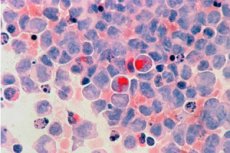New publications
Experiments show how cancer cells avoid starvation and death from chemotherapy
Last reviewed: 02.07.2025

All iLive content is medically reviewed or fact checked to ensure as much factual accuracy as possible.
We have strict sourcing guidelines and only link to reputable media sites, academic research institutions and, whenever possible, medically peer reviewed studies. Note that the numbers in parentheses ([1], [2], etc.) are clickable links to these studies.
If you feel that any of our content is inaccurate, out-of-date, or otherwise questionable, please select it and press Ctrl + Enter.

Lab experiments with cancer cells have revealed two key mechanisms that allow tumors to evade drugs designed to kill them by blocking their metabolism.
Chemotherapy, while effective in treating cancer and prolonging patient survival, often loses its effectiveness due to the ability of cancer cells to rewire their metabolic processes to survive. Many drugs in the antimetabolite category work by disrupting processes essential to tumor growth and survival, such as the synthesis of pyrimidines, the molecules that form the basis of RNA and DNA nucleotides.
Key findings of the study
Mechanism of drug action and tumor evasion
- The drugs used in the study (raltitrexed, PALA, brequinar) block the synthesis of pyrimidines, which leads to the depletion of their reserves in the cell and, ultimately, to apoptosis (programmed cell death).
- However, in a low-glucose environment (tumor microenvironment), cancer cells slow down their use of available pyrimidine reserves. This slowdown prevents chemotherapy from working effectively, since depleted pyrimidine reserves are needed to trigger cell death.
The effects of low glucose levels
- Low glucose levels interfere with the activation of BAX and BAK proteins, which trigger apoptosis by destroying the cell's mitochondria.
- Decreased glucose levels also slow the conversion of one form of pyrimidines (UTP) to another needed for cellular processes (UDP-glucose).
Genes Critical for Survival
- An analysis of 3,000 genes associated with cell metabolism found that most of them are involved in the synthesis of pyrimidines, confirming that this metabolic pathway is critical for cancer cell survival in low-glucose conditions.
Practical significance
The study sheds light on the mechanisms by which cancer cells survive in adverse conditions and opens up prospects for new therapeutic approaches:
Developing new chemotherapy combinations:
Future drugs may "trick" cancer cells into behaving as they would in a normal glucose environment, making treatment more effective.Diagnostics and prognosis:
The ability to develop tests to determine how a particular patient's tumor responds to low glucose conditions will help personalize treatment.Alternative pathways research:
Blocking additional metabolic pathways in cancer cells to induce apoptosis. In particular, Chk-1 and ATR inhibitors are promising avenues, although patient tolerability remains a limitation.
Next steps
The researchers plan to continue to study other metabolic pathways and the mechanism by which apoptosis is triggered under low glucose conditions to identify additional targets for chemotherapy. This could significantly improve treatment outcomes and expand the possibilities for combating resistant forms of cancer.
The study was published in the journal Nature Metabolism.
